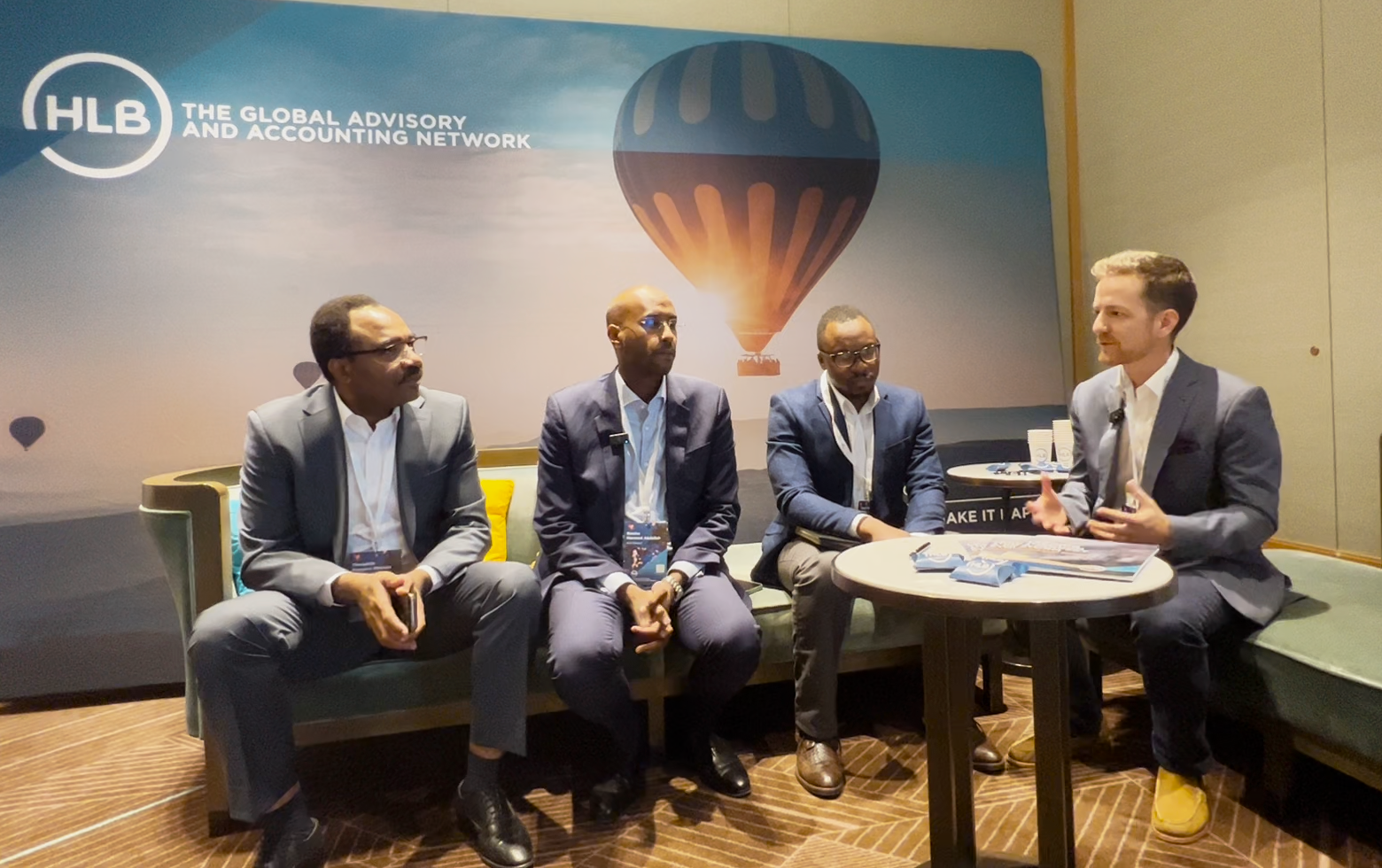The rising potential of Africa
At the HLB Global Summit in Osaka, Japan, Brendan Quirk, HLB Director of North America, engages in a discussion with delegates from HLB Africa about the continent's economic ecosystem.
Against the backdrop of Africa's complex economic landscape, the conversation with Ramiss Houmed, Managing Partner at HLB Djibouti, Simon Peter Millioni, Partner in Audit & Assurance at HLB Zambia, and Theophile Pemenzi Mfonzie, General Manager at HLB Premus (HLB Gabon), uncovers the challenges and opportunities shaping Africa's evolving business scene.

Africa's fastest-growing sectors
The conversation starts by highlighting the industries experiencing rapid growth in Africa. Overall, the continent's evolving sectors demonstrate a combination of innovation and sustainability across different regions, with the financial sector appearing to lead the way in recent years.
Simon provides insights from the southern region, specifically Zambia, where the growth of the financial sector is driven by initiatives aimed at promoting a cashless society. As part of this drive, the central bank has granted local telecommunication companies permits to engage in mobile money transactions.
This shift has led to increased use of mobile money for transactions, boosting both the financial and ICT sectors. As a result, it has become a standard practice for individuals in Zambia to conduct financial transactions using an e-account on a mobile money telecommunications platform, solely utilising their mobile phones.
Shifting the focus to East Africa, Ramiss sheds light on its burgeoning logistics and port services, noting a growing trend towards environmentally sustainable practices, including the adoption of green energy, which leverages the region's abundant solar resources. In Central Africa, Theophile highlights major industries like oil production, mining, and the dominant wood industry.
Challenges of the accounting profession
While Africa has seen considerable advancement in sectors like technology, infrastructure, and the overall economy, challenges remain within the accounting profession. Among these is a declining interest among young people in pursuing careers in accounting, reflecting a trend seen globally in the field.
While accounting was previously a preferred choice, with around seven out of ten graduates pursuing careers in the field, it now appears to have lost its appeal. There has been a noticeable decline in the number of young individuals opting for this professional path, with many attributing this trend to challenges related to work-life balance, prompting them to seek opportunities elsewhere.
"From the few interactions that I've had with a lot of young people, mainly in audit, many are saying life balance is not there. They are having challenges to really accept that. They are saying if I go into a firm, for example, I'll never have time for myself," Simon notes.
Which professions are becoming increasingly popular among Africa's youth? It seems that a growing number of young people are gravitating towards careers in information and communication technology (ICT), primarily because being a tech professional is perceived as more enjoyable than pursuing a career in accounting.
Nevertheless, the accounting profession retains its significance in Zambia, boasting a larger number of professionals compared to other fields such as law. Presently, Zambia counts approximately 2,000 lawyers, whereas the number of accountants surpasses 7,000. However, the continued decline in the number of young individuals choosing accounting as a career path remains worrisome.
Professional services sector shaped by foreign investor needs
Further discussion highlights the need for Africa's professional services sector to adjust to the changing demands of a globalised market.
Ramiss notes the increase of foreign investors in the region, which brings opportunities and challenges for local professionals. Meeting these investors' expectations for professional services like those in their home countries is often challenging. However, striving to meet these expectations pushes local professionals, including accountants, to enhance their practices and attitudes. Theophile shares the same view, stressing the importance of offering diverse services to meet the needs of foreign companies.
ESG through an African lens
ESG (Environmental, Social, and Governance) practices are gaining momentum worldwide as clients increasingly prioritise compliance with ESG standards. In Africa, the trend aligns with the influx of foreign investors, leading to the development of new services to support clients in ESG reporting.
Still, while there is recognition of its significance, there is also a lack of awareness and education about ESG among professionals and clients. However, ESG is expected to become more prominent in African reporting practices as standards evolve, signalling a shift in how business reporting is conducted.
Increasing adoption of new technologies despite obstacles
While historically lagging behind in technological advancements, recent years have seen a significant uptick in technology adoption. Adopting proven technologies from abroad brings vast opportunities for Africa's tech landscape, while initiatives like Elon Musk's Starlink offer hope for improved connectivity.
Despite the increasing emphasis on digitisation, challenges persist. This is particularly true in rural areas with limited mobile network access. Also, many governments still rely on manual processes. Overcoming these obstacles could improve efficiency and accessibility across sectors, benefiting both governments and citizens.
One such example is the intersection of technology and the banking sector, which created immense opportunities, particularly in mobile payments and transactions. By leveraging mobile phones, individuals can gain access to banking services, enabling them to save and store value conveniently.
While technology holds immense promise, it also brings new risks, including cyber risks. Cybersecurity experts recognise Africa as an emerging target for cyber threats, prompting the expansion of cybersecurity services in the region.
Purpose-driven business initiatives
Purpose-driven business initiatives are gaining traction in the continent, influencing clients to prioritise social and environmental objectives alongside financial goals. Professionals are expected to align their practices with this ethos, offering expertise and tools to enhance client trust and satisfaction.
Positioned for growth
Opportunities in Africa abound, with growing economies and debt restructuring initiatives fostering a stable business environment. For instance, debt restructuring efforts in Zambia are expected to stabilise the exchange rate and inflation, attracting foreign investors, and driving demand for advisory, accounting, and audit services. Likewise, other African countries are experiencing similar trends, signalling a promising future for purpose-driven businesses and professional services across the continent.
How HLB can help you navigate and thrive doing business on the African continent
As the continent tackles challenges and embraces transformation, its potential as a global economic force becomes increasingly evident. Through effective strategies and collaborations, Africa appears poised to pursue sustainable growth on a global scale.
In 2024, HLB will launch a global China outbound campaign, with a special focus on Belt and Road markets, aiming to disseminate HLB’s expertise and leverage local resources. Client forums will take place in Africa, Southeast Asia, and Latin America, to explore synergies and opportunities with HLB clients, prospects and business partners.
Contact our local experts at HLB Global to discuss how you can leverage the opportunities from the second fastest-growing region in the world.
Global China Service
HLB launched the award-winning Global China Service in 2010, as a market pioneer to provide one-stop-shop solutions to assist bilateral trade and investment between China and rest of the world. Chinese-speaking professional teams are established in key commercial centres to contribute to the sustainable growth of Chinese companies locally, regionally and globally.
Learn more about this service in this conversation with Coco Liu, Chief Regional Officer, Asia Pacific & Head of Global Business Channels and Ramiss Houmed, HLB Djibouti, Simon Peter Millioni, HLB Zambia and Michael Maina, HLB Rwanda.




